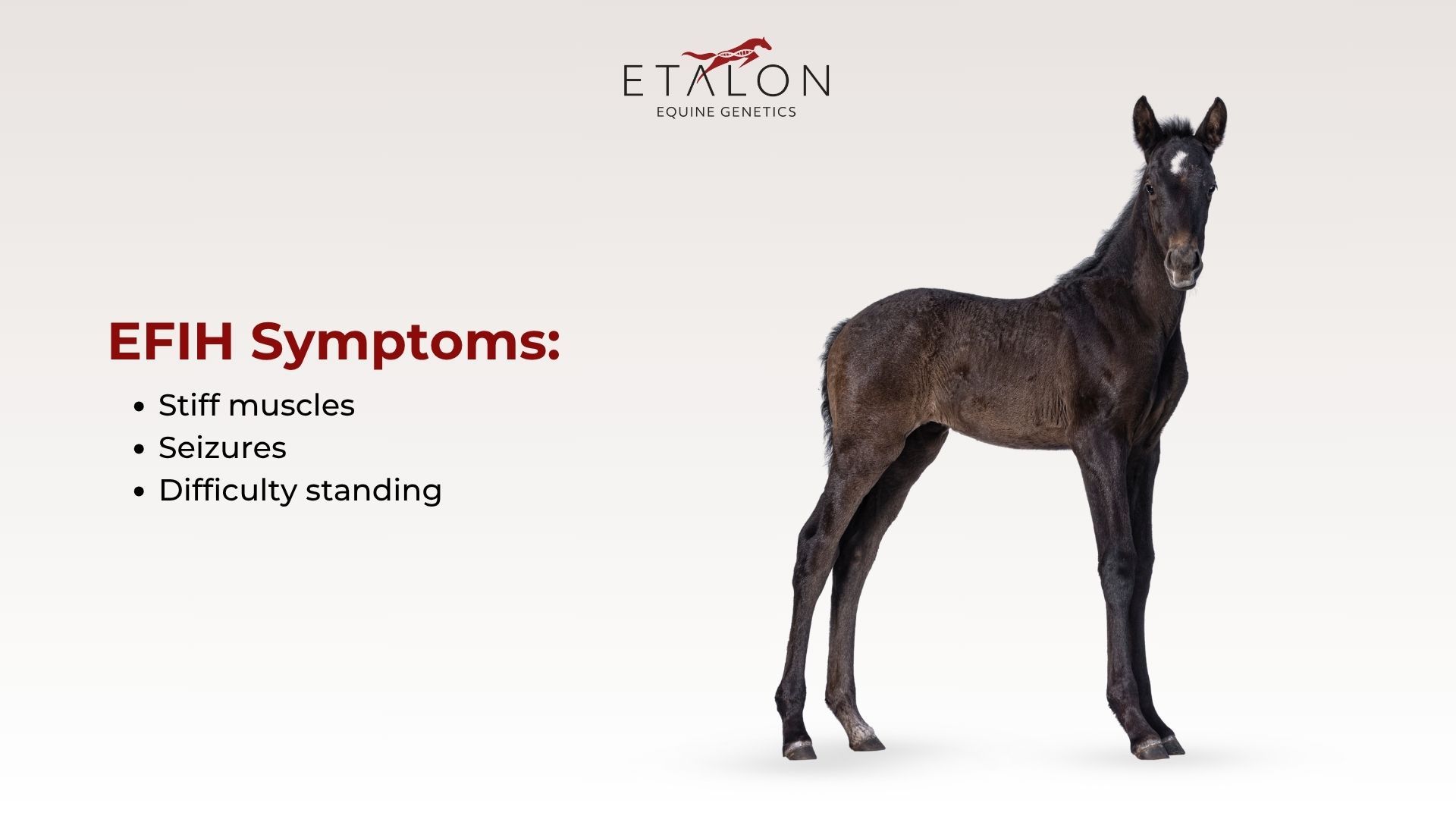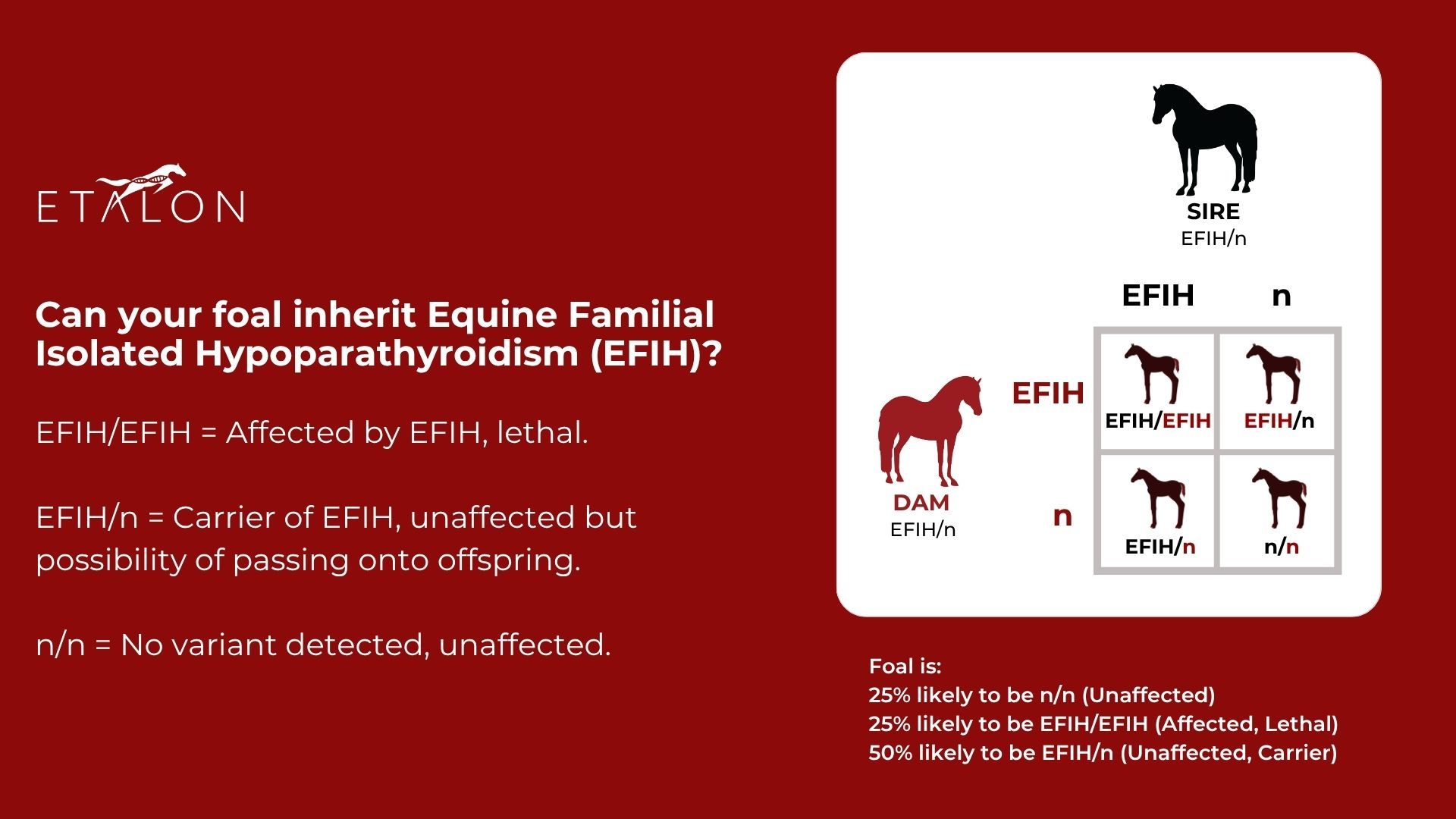Genetic Health Risks: Equine Familial Isolated Hypoparathyroidism (EFIH)
July 29, 2025
Equine Familial Isolated Hypoparathyroidism (EFIH) might be a mouthful to say, but this inherited condition carries serious consequences for affected foals. In 2020, researchers identified a nonsense variant in the RAPGEF5 gene, which is responsible for this rare but fatal disorder in Thoroughbred horses.¹
Foals born with EFIH appear normal at birth but rapidly develop life-threatening symptoms such as muscle tremors, stiffness, seizures, and weakness due to dangerously low calcium levels. The discovery of a genetic cause has helped owners, breeders, and veterinarians better understand, manage, and, most importantly, prevent this heartbreaking condition.
Key Takeaways
EFIH is a genetically inherited condition that leads to low parathyroid hormone (PTH) levels and life-threatening hypocalcemia in foals.
Affected foals may appear normal at birth but develop symptoms within the first 35 days of life. The condition is recessively inherited, meaning foals must inherit two copies of the gene variant to be affected. A nonsense variant in the RAPGEF5 gene has been identified as the genetic cause in Thoroughbred foals. Genetic testing is currently the most reliable method for identifying carriers and preventing affected births through informed breeding.
What Is Equine Familial Isolated Hypoparathyroidism (EFIH)?
EFIH is a congenital endocrine disorder in which affected foals are born without functional parathyroid glands or the ability to produce parathyroid hormone (PTH). PTH's job is to regulate calcium and phosphorus, which helps to maintain proper muscle function and nerve signaling.
Without enough PTH, a foal's blood calcium levels plummet, resulting in severe, rapidly progressing symptoms. The condition is isolated, meaning it affects the parathyroid glands without involving other endocrine organs.
How Common Is EFIH?
EFIH is relatively rare, with confirmed cases so far reported only in Thoroughbred foals. The exact prevalence of the condition and carrier frequency within the breed remains unknown, as testing is not yet widespread.
However, given the severity and fatal nature of the disease, any number of cases is significant, especially in breeds with tightly managed bloodlines. Further research may reveal the presence of the variant in other populations.
Symptoms of EFIH
Most affected foals appear completely normal at birth but begin to show signs of distress within the first 35 days of life. These signs are caused by severe hypocalcemia and can include:
- Muscle stiffness or rigidity
- Involuntary muscle tremors or twitches
- Gait stiffness
- Generalized weakness or inability to stand
- Seizures
- Without prompt intervention, symptoms will progress and are, unfortunately, always fatal.

Diagnosis
Diagnosis of EFIH involves a combination of clinical signs, bloodwork, and hormonal assays, including:
- Low serum calcium (ionized calcium is the most reliable indicator)
- Low or undetectable parathyroid hormone (PTH) levels
- Elevated phosphorus levels
- Normal kidney function and absence of other systemic disease
- Confirmatory genetic testing can definitively diagnose the disorder postmortem or help identify carriers in breeding stock.
Treatment
There is currently no known cure for EFIH. Supportive treatment options may include: Calcium supplementation to temporarily raise calcium levels and manage seizures
Intensive monitoring in a neonatal ICU setting Despite these efforts, supportive care is only a short-term solution, and foals with EFIH do not survive.
Genetic Component
In a 2020 study led by Rivas et al., researchers used whole-genome sequencing to identify a nonsense mutation in the RAPGEF5 gene associated with EFIH. This gene plays a role in cell signaling and development, including processes critical to parathyroid gland formation.
The mutation (c.2624C>A p.Ser875*) introduces a premature stop codon, truncating the protein product and disrupting its normal function. All affected foals were homozygous for the variant, confirming its recessive mode of inheritance.
This finding represents a breakthrough in understanding the molecular cause of EFIH, allowing for preventive genetic testing in Thoroughbreds.
Genetic Testing for EFIH
Etalon Equine Genetics offers a DNA test that detects the genetic EFIH variant, now available as part of the Pro Package 2.0

Prognosis
Unfortunately, the prognosis for foals with EFIH is poor. The disease is fatal, even with intensive veterinary care. The only long-term solution is through preventive breeding based on genetic testing.
Prevention
Since EFIH is inherited in an autosomal recessive pattern, the best prevention is genetic screening of breeding stock.
- Test both mares and stallions, especially in Thoroughbred lines.
- Avoid breeding two carriers.
- Use genetic test results to make responsible breeding decisions and avoid the emotional and financial toll of losing a foal to EFIH.
As genetic testing becomes more widely available, breeders have a powerful opportunity to eliminate this condition from their herds.
Conclusion
Equine Familial Isolated Hypoparathyroidism is a devastating yet preventable disease. Although rare, it has catastrophic consequences for affected foals. With the discovery of a causative variant in the RAPGEF5 gene in Thoroughbreds, we now have the tools to test, manage, and hopefully eliminate this disease through informed breeding practices.
Whether you're a Thoroughbred breeder, an owner planning a foal, or a veterinarian advising clients, early genetic screening can make all the difference. Etalon's EFIH test is available in the Pro Package 2.0, offering clarity and peace of mind when it matters most.
References
1 Rivas VN, Magdesian KG, Fagan S, Slovis NM, Luethy D, et al. (2020) A nonsense variant in Rap Guanine Nucleotide Exchange Factor 5 (RAPGEF5) is associated with equine familial isolated hypoparathyroidism in Thoroughbred foals. PLOS Genetics 16(9): e1009028. https://doi.org/10.1371/journal.pgen.1009028
News & Media
Updated Phenotypical and Genetic Assumptions for Roan Horses
Updated Phenotypical and Genetic Assumptions for Roan Horses. Etalon partners with the American Roan Horse Association.
How to Dual Register Your AQHA Horse with APHA
Genetic testing can uncover white genes to help your horse qualify for dual registration with APHA & AQHA for additional earning, competition, and breeding opportunities.
Genetic Health Risks: Distichiasis (DIS)
Distichiasis is a disorder where abnormal eyelashes grow from the eyelid margin, often irritating the cornea. Genetic testing can identify affected horses and carriers, supporting breeding decisions and facilitating early intervention.
Podcast Episodes
From Hoofbeats to Healing: Veterans and Mustangs
Genetics Unbridled Podcast | Ep. 10
What if there was a way to bridge the gap between military veterans and their civilian lives using the unlikeliest of companions—wild mustangs? Or a w...
Press Releases
Etalon Equine Genetics Discovers Three New White Marking Variants in a New Gene
March 20, 2024
Menlo Park, CA - Etalon Equine Genetics has made another landmark discovery in the field of equine genetics. For the first time in 10 years, a new genetic region for color has been found!
Read MoreEtalon Equine Genetics Discovers New Novel White Variant in Pura Raza Española Horses
December 23, 2023
Menlo Park, CA - Etalon Equine Genetics, a leading provider of equine DNA testing services, has made an exciting breakthrough in equine genetics.
Read MoreAPHA Approves New White Marking Variant W35 “Holiday” in Horses Discovered by Etalon Equine Genetics
December 23, 2023
Menlo Park, CA - Etalon Equine Genetics, a leading provider of DNA testing services, has made another novel discovery in the field of equine genetics. The company has identified a new white marking variant now designated as W35.
Read More